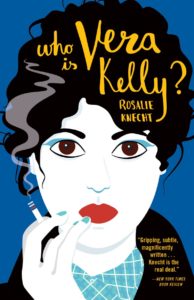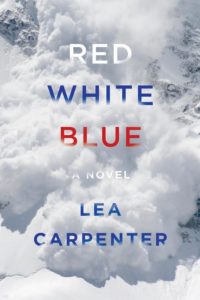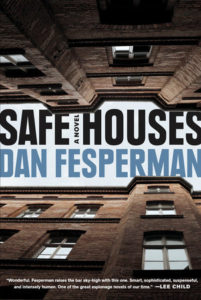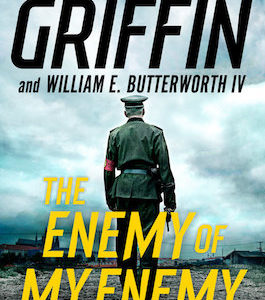There are many areas of the crime and mystery world to be excited about in 2018, where startling new stories are being told in innovative ways, cultures are intersecting, and identities are being explored with nuance and insight, but quite possibly the first among peers has to be espionage fiction. More and more, many of our most talented authors are turning to the world of intelligence gathering and finding there the grist for powerful new work. It makes sense, doesn’t it? Espionage has always been tied up with dual identities, coded communication, the foundations of knowledge, the manipulation of wills, and all the other tricks and trappings of a spy’s life. The novelist and the spy, it turns out, are practically relatives.
We’ve decided to round up our favorites from a strong year in espionage fiction. Let’s establish some parameters up front. We’re going to make a rather haphazard distinction between “espionage fiction” and “spy thrillers.” Espionage fiction, let’s say, is focused on intelligence gathering and the inner lives of spies. Spy thrillers are focused on the actions of spies and the geopolitical and military ramifications of their spycraft. (Yes there’s plenty of overlap—that’s why these books are so great.) We love all kinds of spy novels, and tomorrow we’ll be looking at the year’s best political and spy thrillers. Today, let’s celebrate the year’s best works of espionage fiction, ten novels that burrow deep into the souls of spies and their quarry.
Rosalie Knecht, Who Is Vera Kelly? (Tin House)
People who know us know that two of our, say, top five interests include midcentury double identity stories and underground Latin American political/intellectual scenes. As it happens, those are the very same driving forces behind Rosalie Knecht’s new novel, Who Is Vera Kelly?, a strange and innovative take on the spy novel, one that’s noir and full of ambiguities, doubles, and double-crosses. There’s political intrigue, spycraft, solid location work, and all the things you would want from espionage fiction, but there’s also something strange and subversive going on in this story. Knecht has a live-wire intellect and we hope she sticks with spy fiction of some kind of another, because this is just the kind of jolt the genre (our beloved genre) needs now and again.
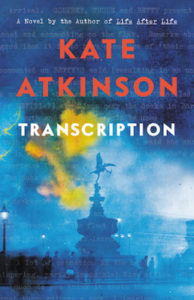
Kate Atkinson, Transcription (Little, Brown)
We sped through this droll new espionage novel, chock-full of 5th columnists, surveillance, and strong cups of tea. Atkinson lovingly channels le Carre and Helen MacIness through her descriptions of drab spies, pathetic Nazi sympathizers, and secretaries who know far more than they’re letting on. There’s an ongoing misconception that women don’t write traditional espionage fiction, and Transcription should clear this up once and for all.
Jean-Patrick Manchette, Ivory Pearl (NYRB)
The unfinished novel by the godfather of the néo-polar, one of the great talents of postwar crime fiction. Ivory Pearl is a fever dream of a spy thriller, jumping between Cold War hotspots (East Berlin, Vietnam, Cuba) and shuffling through a cast of characters with shifting allegiances and obscure motivations. Manchette’s stories are often brutal, but infused with a live wit and a forceful style. I’d read anything with his name on it, but this one, raw and inchoate, has a special appeal.

Jason Overstreet, Beneath the Darkest Sky (Dafina)
In Overstreet’s first novel, architect Sidney Temple is recruited by the FBI to spy on Marcus Garvey’s back-to-Africa movement, but instead chooses to report on both Garvey and the FBI to WEB du Bois. Now an international consultant under the new name of Prescott Sweet, Sidney has moved the family to Russia for the second installment in the series. He’s slated to work for the American embassy, yet Moscow in 1937 proves treacherous for a man walking the tightrope between diplomacy and espionage. Overstreet is taking espionage fiction in an exciting new direction, mining the world of intelligence and counterintelligence to explore historical rifts and traumas that never quite healed and continue to shape our society today.
Mick Herron, The Marylebone Drop (Soho Crime)
Mick Herron is a master at crafting intricate tales of espionage, and his latest, the Marylebone Drop, promises to be just as full of intrigue and mayhem as his previous works. When a retired spy witnesses some secretive behavior on the street, he knows he’s a witness to espionage, but when he brings in his old spymaster, the two have little idea how big their investigation will get.
Lea Carpenter, Red, White, Blue (Knopf)
The spy novel is one of the most ambitious literary forms around, and we’re always heartened seeing an author take up the challenge of doing something truly original with it, which certainly fits the bill for Lea Carpenter’s novel, Red, White, Blue. Carpenter tells her story in fragments that jump across time, space, and emotional tenor, telling the story of a young woman indoctrinated from a young age into a life of espionage, her family’s own sordid history, and the strange, intricate and often deeply troubling history of modern US intelligence itself. That’s a lot to take on in a novel, but Carpenter handles it with impressive expertise, with the result an engaging and provocative book that drives forward on the level of plot, ideas, and character.
Dan Fesperman, Safe Houses (Knopf)
Dan Fesperman, with his penchant to roam all over the place with his historic and contemporary settings, may be the best spy novelist you’ve never heard of, although that’s changing, with his last book, The Letter Writer, greeted with widespread acclaim upon release. His new novel, Safe Houses, is an elegant work of espionage fiction. When a former spy and her husband are murdered, their daughter hires an investigator to look into her mother’s past in search of answers, desperate to save her brother from taking the blame.
Daniel Silva, The Other Woman (Harper)
The Other Woman is the eighteenth in the Gabriel Allon series, and the characters feel as timely and complex as ever. Silva’s latest wades into the new intelligence era of Russia versus the West, this time with Allon’s alliance of spooks chasing after the assassins who take down a would-be Russian defector. Silva’s prose has a crisp elegance, and the worldview he offers up is sophisticated and complex, a crash course in the modern-day espionage hotspots and modus operandi.
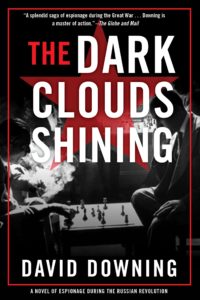
David Downing, Dark Clouds Shining (Soho Crime)
For years now, Downing’s historical espionage novels have been some of the most transporting stories around, full of finely observed everyday details that make the reader feel as though they’re at the very center of world historical events and yet also in a familiar, lived-in space. In Dark Clouds Shining, the concluding chapter of the Jack McColl series, our troubled hero is given a Alec Leamas-style mission, let free from an English jail and sent to Moscow, where he gets up to a lot of crossing and double-crossing with a bit of heartbreak mixed in. Spending time in post-revolutionary Russia with Downing as a guide is a special treat, and nobody is better at showing how people from all walks of life get slowly entangled in webs of espionage.
Louisa Hall, Trinity (Ecco)
Louisa Hall’s new novel of Cold War fears takes us into the life of J. Robert Oppenheimer as he’s tailed by a secret service agent while waffling on the implications of his work on the nuclear bomb. Beginning with a visually intricate tailing sequence, and zooming out to examine Oppenheimer and his internal conflicts from a variety of perspectives, Trinity is essential reading for fans of le Carré and his classics of Cold War espionage fiction.


